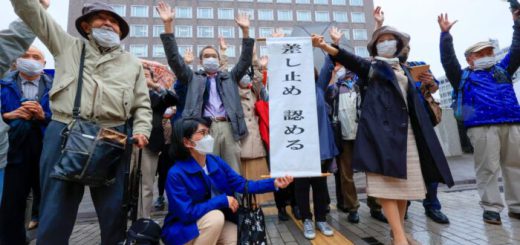Pre-arranged Conclusion: Kansai Electric Power Co.’s attempt to trivialize the scandal is impermissible
CNIC STATEMENT
October 3, 2019
Twenty top executives of Kansai Electric Power Co. (KEPCO) have received gifts worth a massive amount from Moriyama Eiji, a former official of Takahama Town in Fukui Prefecture that hosts one of the utility’s nuclear power plants. This scandal was revealed due to an investigation by the Kanazawa Bureau of the National Tax Agency (NTA). Moriyama, the late deputy mayor of Takahama between 2006 and 2018, had close ties with a number of local companies that received construction and other orders from KEPCO. He seems to have given part of the funds he received from such companies as rewards for his mediation efforts to KEPCO executives.
Moriyama also served as part-time adviser for the KANDEN PLANT Corporation, KEPCO’s fully-owned subsidiary, for more than 30 years. KEPCO received an order from NTA to conduct an in-house investigation. The company compiled the investigation report and punished some of its officials in September 2018. The utility, however, failed to make this scandal public until it was revealed by the mass media.
Even KEPCO’s report on its extremely limited-scale in-house investigation said the top executives received gifts worth 320 million yen during the seven years. This is an outrageous incident. Confronted with mounting criticism from the public, KEPCO has announced that it will organize an independent panel to conduct another internal investigation.
In KEPCO’s September report, the Takahama Town official’s unusual character was strongly emphasized, and it was stated that the utility’s executives were reportedly forced to receive the gifts. The description gives the impression that KEPCO was the victim. Despite this report, KEPCO was fully aware that some of its executives received gifts directly from local companies without any mediation by Moriyama. Does this mean that KEPCO was also forced to receive gifts by the local companies? Moreover, both KEPCO and its report said the contract prices at which the utility issued orders to the local companies were fair and appropriate.
This is ridiculous. The tax agency’s investigation has disclosed that one local dealer paid 300 million yen to Moriyama, of which 180 million yen was given to KEPCO. Where did this 300 million yen come from? KEPCO said it is not known where this money came from. If the utility’s executives were telling the truth, it means that they are incompetent and stupid. It is obvious that the local company padded the contract price.
The main problem in this scandal is that KEPCO took advantage of its monopolistic status as a public utility, established a close relationship with an influential local official and issued orders to local contractors at exorbitant prices without paying any attention to the heavy financial burdens on its consumers. This corporate culture of the utility allowed Moriyama to commit wrongful and unjustifiable interventions. KEPCO claims that its order prices for Takahama’s local dealers were on the same level as those for dealers in other areas. If so, we must question why KEPCO’s contract prices were generally so high.
KEPCO calls on the independent committee to 1) conduct additional investigations on the Moriyama case, 2) investigate to see if there are any other cases in which its officials received questionable gifts from contractors, and 3) judge whether KEPCO’s investigation process, results and response to the results were appropriate. These three points, however, indicate that the utility company is trying to trivialize this scandal.
What KEPCO should ask the independent committee to do is, first of all, to investigate if its contract prices were appropriate and if the issuance of its orders was done in a fair manner. Furthermore, it should ask the committee to find out when, by whom and in what way the gifts were returned to the donor. KEPCO is asserting that the main cause of this scandal is the heavy-handed and aggressive character of Moriyama, and by doing so, it is attempting to trivialize this scandal. This is an unforgivable act. The government should not consider this scandal as an isolated incident committed by KEPCO. Instead, it should regard this as a problem inherent to the electric power industry. The number of similar cases in which electric power companies placed construction and other orders with local dealers run by or affiliated with local influential persons is too numerous to mention,
KEPCO’s corporate culture of trying to conceal problems and avoid responsibility reminds us of the 2004 fatal accident that occurred at its Mihama NPP north of Kyoto. Heated steam erupted from a corroded pipe, killing five workers and severely burning six others. This time, KEPCO has imposed extremely light punishment on the top executives who received gifts worth more than 100 million yen, and moreover, attempted to cover up the case. KEPCO is very lenient toward its officials and is incapable of facing up to inconvenient and unbearable truths. Does such a company have the ability to deal with the extremely sophisticated technology required to control nuclear fission? KEPCO must also ask the independent committee if it has sufficient competence not only to implement corporate governance but also to run the nuclear power generation business.

